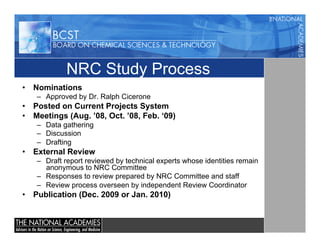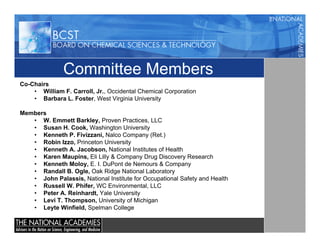Reinhardt Prudent Practices
- 1. An Update of Prudent Practices in the Laboratory: Handling and Disposal of Chemicals Peter A. Reinhardt, Director Yale Environmental Health & Safety 9 October 2009
- 2. Previous Versions ŌĆóŌĆ» Prudent Practices for Handling Hazardous Chemicals in Laboratories (1981) ŌĆóŌĆ» Prudent Practices for Disposal of Chemicals from Laboratories (1983) ŌĆóŌĆ» Prudent Practices in the Laboratory: Handling and Disposal of Chemicals (1995)
- 3. Impact of 1981 Version Summary reproduced in non-mandatory appendix of 29 CFR 1910.1450, ŌĆ£Occupational Exposure to Hazardous Chemicals in LaboratoriesŌĆØ (The Laboratory Standard): ŌĆ£Prudent Practices is cited because of its wide distribution and acceptance and because of its preparation by members of the laboratory community through the sponsorship of the National Research Council.ŌĆØ
- 4. 1995 Version Prudent Practices in the Laboratory: Handling and Disposal of Chemicals (1995) ŌĆóŌĆ» Addressed both safe handling and waste disposal in one volume ŌĆóŌĆ» Emphasized ŌĆ£Culture of SafetyŌĆØ ŌĆóŌĆ» Introduced Laboratory Chemical Safety Summaries ŌĆóŌĆ» Provided guidance for training ŌĆóŌĆ» More than 17,000 copies sold
- 5. Who Reads The Book? ŌĆóŌĆ» Students ŌĆóŌĆ» Science educators ŌĆóŌĆ» Researchers ŌĆóŌĆ» Technicians ŌĆóŌĆ» Chemical Hygiene Officers ŌĆóŌĆ» Safety Directors ŌĆóŌĆ» Laboratory managers ŌĆóŌĆ» EH&S personnel ŌĆóŌĆ» Waste management personnel
- 6. How Is it Used? ŌĆóŌĆ» In the creation of: ŌĆōŌĆ» Chemical Hygiene Plans ŌĆōŌĆ» Safety rules and regulations ŌĆōŌĆ» Emergency action plans ŌĆōŌĆ» Laboratory inspection forms ŌĆóŌĆ» As a course textbook ŌĆóŌĆ» Referenced in publications and presentations ŌĆ£The ŌĆśgo-toŌĆÖ source for questions about lab safetyŌĆØ
- 7. Reviews of 1995 Edition ŌĆ£ŌĆ”the most comprehensive reference book for the laboratory shelf.ŌĆØ ŌĆöChemistry in Britain ŌĆ£All in all, this is an excellent reference to keep at hand in any laboratory. It gives just the right information, it is just the right size, and the pages appear to be of the right thickness to survive repeated thumbing through them.ŌĆØ ŌĆöScience Books and Films ŌĆ£ŌĆ”the seminal reference book on laboratory safety.ŌĆÖ ŌĆöB.L. Foster
- 8. 1995 Recommendations Recommended the following regulatory changes: ŌĆóŌĆ» Encourage consistency among federal and state laws ŌĆóŌĆ» Regulate labs by performance-based standards ŌĆóŌĆ» Allow treatment of small quantities of lab waste ŌĆóŌĆ» Allow hazardous waste storage beyond current time limits ŌĆóŌĆ» Allow one EPA I.D. number per campus ŌĆóŌĆ» Establish a de minimis level for low level radioactive laboratory waste ŌĆóŌĆ» Allow DIS of short half-life mixed waste without a RCRA permit
- 9. Purpose of the New Edition Revise to: ŌĆóŌĆ» Address new developments and challenges in chemistry and safety ŌĆóŌĆ» Further emphasis and guidance on nurturing ŌĆ£culture of safetyŌĆØ ŌĆóŌĆ» Consider impact of lab operations on environment and community
- 10. Preliminary Scoping Meeting E. Barkley B. Foster C. Geraci K. Jacobson N. Langerman D. Lillquist B. Packer R. Phifer G. Poje P. Reinhardt R.V. Rodriquez E. Talley G. Trammell
- 11. Sponsors ŌĆóŌĆ» Department of Energy ŌĆóŌĆ» National Institutes of Health ŌĆóŌĆ» National Science Foundation ŌĆóŌĆ» Air Products and Chemicals, Inc. ŌĆóŌĆ» American Chemical Society ŌĆóŌĆ» DuPont ŌĆóŌĆ» Eastman Chemical Company ŌĆóŌĆ» Howard Hughes Medical Institute ŌĆóŌĆ» PPG Industries
- 12. NRC Study Process ŌĆóŌĆ» Nominations ŌĆōŌĆ» Approved by Dr. Ralph Cicerone ŌĆóŌĆ» Posted on Current Projects System ŌĆóŌĆ» Meetings (Aug. ŌĆÖ08, Oct. ŌĆÖ08, Feb. ŌĆś09) ŌĆōŌĆ» Data gathering ŌĆōŌĆ» Discussion ŌĆōŌĆ» Drafting ŌĆóŌĆ» External Review ŌĆōŌĆ» Draft report reviewed by technical experts whose identities remain anonymous to NRC Committee ŌĆōŌĆ» Responses to review prepared by NRC Committee and staff ŌĆōŌĆ» Review process overseen by independent Review Coordinator ŌĆóŌĆ» Publication (Dec. 2009 or Jan. 2010)
- 13. Committee Members Co-Chairs ŌĆóŌĆ» William F. Carroll, Jr., Occidental Chemical Corporation ŌĆóŌĆ» Barbara L. Foster, West Virginia University Members ŌĆóŌĆ» W. Emmett Barkley, Proven Practices, LLC ŌĆóŌĆ» Susan H. Cook, Washington University ŌĆóŌĆ» Kenneth P. Fivizzani, Nalco Company (Ret.) ŌĆóŌĆ» Robin Izzo, Princeton University ŌĆóŌĆ» Kenneth A. Jacobson, National Institutes of Health ŌĆóŌĆ» Karen Maupins, Eli Lilly & Company Drug Discovery Research ŌĆóŌĆ» Kenneth Moloy, E. I. DuPont de Nemours & Company ŌĆóŌĆ» Randall B. Ogle, Oak Ridge National Laboratory ŌĆóŌĆ» John Palassis, National Institute for Occupational Safety and Health ŌĆóŌĆ» Russell W. Phifer, WC Environmental, LLC ŌĆóŌĆ» Peter A. Reinhardt, Yale University ŌĆóŌĆ» Levi T. Thompson, University of Michigan ŌĆóŌĆ» Leyte Winfield, Spelman College
- 14. Seeking Scope & Content Information ŌĆóŌĆ» Public submissions through the NAS Current Projects System ŌĆóŌĆ» Online questionnaire
- 15. Do You Use Prudent Practices in the Laboratory?
- 16. Which Chapters are Most Helpful?
- 17. Are Treatment Procedures & LCSSs Helpful?
- 18. Topics for the Next Edition
- 19. The StudyŌĆöContent Decisions & Writing Three meetings, many speakers ŌĆóŌĆ» Dennis Deziel, DHS ŌĆóŌĆ» Michael Ellenbecker, TURI, University of Massachusetts ŌĆō Lowell ŌĆóŌĆ» Drew Endy, Stanford University ŌĆóŌĆ» Dennis Fantin, California Polytechnic State University ŌĆóŌĆ» Barbara Karn, EPA ŌĆóŌĆ» Clyde Miller, BASF ŌĆóŌĆ» John Miller, DOE ŌĆóŌĆ» Todd Pagano, Rochester Institute of Technology ŌĆóŌĆ» Russ Phifer, ACS ŌĆóŌĆ» Cay Supalo, Penn State University ŌĆóŌĆ» Candice Tsai, TURI, University of Massachusetts ŌĆō Lowell
- 20. New Topics ŌĆóŌĆ» Laboratory Security ŌĆóŌĆ» Emergency Planning and Response ŌĆóŌĆ» Nanotechnology ŌĆóŌĆ» CD with additional materials
- 21. Educational Materials ŌĆóŌĆ» Handouts ŌĆóŌĆ» Checklists ŌĆóŌĆ» Practitioner volume for biologists ŌĆóŌĆ» Possibility of developing training videos ŌĆóŌĆ» Other materials are possible Ideas? Suggestions? Pass them along!
- 22. A Related Study Chemical Management in Developing Countries ŌĆóŌĆ» To promote safe and secure chemical management in developing countries ŌĆóŌĆ» Sponsored by the Department of State ŌĆóŌĆ» Chemical Security Engagement Program (CSP) ŌĆóŌĆ» Prudent Practices (1995) was the basis for the outreach by State
- 23. Chemical Management in Developing Countries ŌĆóŌĆ» Committee asked to: ŌĆōŌĆ» consider safety and security practices ŌĆōŌĆ» provide programmatic guidance to CSP ŌĆōŌĆ» develop educational materials ŌĆóŌĆ» Educational materials will align with Prudent Practices and may be useful outside of CSP ŌĆóŌĆ» Available late 2009 or early 2010
- 24. Questions? Please join us in promoting a culture of safety in laboratories!
























